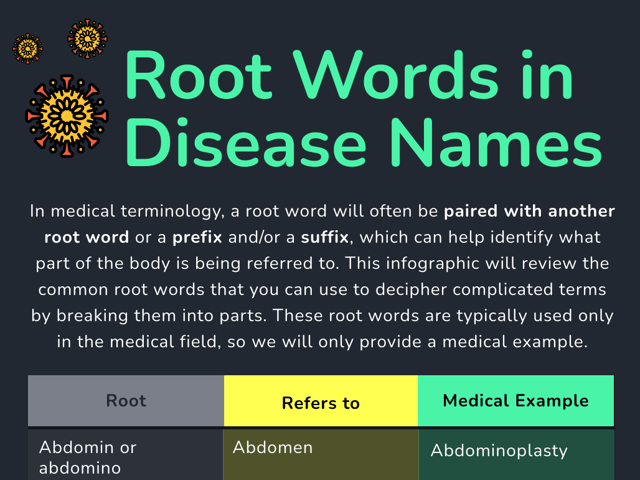
Root Words in Disease Names
Medical language is filled with complex words that can often be daunting to understand. However, most medical terms are made up of interchangeable word parts that, once understood, can demystify even the most complicated terminology. For certified nursing assistants (CNAs), a fundamental understanding of medical language can enhance patient communication and professional development. Today, we will delve into the root words commonly found in disease names.
Breaking Down Medical Language: Root Words, Prefixes, and Suffixes
Before diving deeper into specific root words and their meanings, it’s important to understand what these building blocks of medical language are. Root words, prefixes, and suffixes are the primary components that construct medical terms and give them their unique meanings.
What are Root Words?
A root word is the primary lexical unit of a word, also known as the base or stem of a word. In the context of medical terminology, root words usually denote a part of the body or a bodily function. For instance, Cardi refers to the heart, Dermat refers to the skin, and Neur refers to the nerve.
The Role of Prefixes
A prefix is a group of letters added before a root word, changing its meaning. For example, Brady is a prefix meaning slow. When combined with the root word Cardi (heart), we get Bradycardia, which means slow heart rate.
Understanding Suffixes
A suffix, on the other hand, is a group of letters added at the end of a word to alter its meaning. For instance, itis is a common suffix in medical terminology that indicates inflammation. Therefore, Dermatitis refers to inflammation of the skin (Dermat = skin + itis = inflammation).
By understanding the root word, prefix, and suffix, we can decipher the meaning of complex medical terms. Now that we have a basic understanding of these components, we can dive deeper into the most common root words found in disease names and their meanings.
Root Words in Disease Names
Understanding root words can provide a roadmap to navigate the medical language labyrinth. Let’s explore some root words that are often used in disease names.
The Language of the Body: Abdomen, Fat, and Blood Vessels
The starting point of our journey into medical language begins in the body. The root Abdomin or Abdomino refers to the abdomen, the part of the body containing all the structures between the chest and the pelvis. The medical term Abdominoplasty, for instance, refers to a surgical operation to remove excess flesh from the abdomen.
When it comes to body fat, the roots Adip, Adipo, Lip, or Lipo are used. An example is Lipoma, which is a benign tumor made up of adipose tissue.
The term Angio refers to blood vessels, the intricate network carrying blood throughout the body. An Angiogram is a procedure to view blood vessels after injecting them with a radiopaque substance.
Deciphering Diseases: Cancer, Heart, and Brain
Diving deeper, we encounter Carcin, a root word relating to cancer. In medical parlance, the term Carcinogenic refers to a substance or agent that can cause cancer.
Root words related to the heart include Cardi, Cardio, Coron, or Corona. For example, Cardiography is the process of recording the electrical activity of the heart.
When it comes to the brain, the roots Celebr, Cerebro, Encepha, or Encephelo are used. Encephalitis, for instance, is an inflammation of the brain, typically caused by a viral infection.
More than Skin Deep: Colon, Cranium, and Skin
Root words such as Col or Colo are associated with the colon or large intestine. Colostomy, a procedure to create an opening in the colon, exemplifies this.
Cranium or skull is represented by Crani or Cranio, as seen in the term Craniostomy, a procedure that involves making a hole in the skull to relieve pressure.
The skin, our largest organ, is denoted by roots such as Derm, Dermat, or Dermato. The medical field that specializes in skin conditions is Dermatology.
The Vital Organs: Stomach, Blood, and Nerves
Gastro refers to the stomach. For instance, a Gastrectomy is a surgical procedure to remove part or all of the stomach.
When it comes to blood, Hema is the root used. A Hematoma is a localized bleeding outside of blood vessels.
The root words Neur or Neuro are used for anything relating to nerves, as seen in Neuralgia, a condition characterized by severe, typically intermittent pain in a nerve.
From Bones to Blood Clots: Bone, Ear, Vein, and Clot
The root Oste or Osteo denotes bone, as in Osteotomy, a surgical operation whereby a bone is cut to shorten, lengthen, or change its alignment.
Ot or Oto pertains to the ear, like in Otitis, which is inflammation of the ear.
The roots Phleb, Phlebo, Ven, or Veno are associated with veins. Phlebotomy, the practice of drawing blood for diagnostic tests or for treatment purposes, illustrates this.
Finally, Thromb or Thrombo is a root word that refers to clots, as seen in Hyperthrombosis, an excessive formation of thrombi or blood clots within the blood vessels.
| Root | Refers to | Medical Example |
|---|---|---|
| Abdomin or abdomino | Abdomen | Abdominoplasty |
| Adip, adipo, lip, or lipo | Fat | Lipoma |
| Angio | Blood vessels | Angiogram |
| Carcin | Cancer | Carcinogenic |
| Cardi, cardio, coron, or corona | Heart | Cardiography |
| Celebr, cerebro, encepha, or encephelo |
Brain | Encephalitis |
| Col or colo | Colon or large intestine | Colostomy |
| Crani or cranio | Cranium or skull | Craniostomy |
| Cyan or cyano | Blue | Cyanosis |
| Derm, dermat, dermato | Skin | Dermatology |
| Gastro | Stomach | Gastrectomy |
| Hema | Blood | Hematoma |
| Neur or neuro | Nerve | Neuralgia |
| Oste or osteo | Bone | Osteotomy |
| Ot or oto | Ear | Otitis |
| Phleb, phlebo, ven, or veno | Vein | Phlebotomy |
| Pneum or pneumo | Lung or air | Pneumonia |
| Ren, reno, nephr, or nephro | Kidney | Renal |
| Scler, or sclero | Hardening | Atherosclerosis |
| Thorac or thoraco | Chest | Thoracotomy |
| Thromb or thrombo | Clot | Hyperthrombosis |
| Vascul or vasculo | Blood vessel | Vasculitis |
Conclusion
Developing a strong understanding of these medical terms can be incredibly beneficial, especially for professionals like Certified Nursing Assistants (CNAs) who interact with healthcare providers, patients, and families. Clear and effective communication in healthcare settings is critical for patient safety, care coordination, and overall quality of care.
CNAs preparing for their certification exams may find that understanding the root words, prefixes, and suffixes used in medical language can significantly aid their studies. Many CNA practice tests include questions on medical terminology, and a firm grasp of these components can be a great asset in understanding and remembering the vast array of terms encountered in the healthcare field.
While medical language may initially appear daunting, it becomes far more manageable when broken down into its fundamental elements. So whether you’re a budding healthcare professional preparing for your CNA exam or just an enthusiastic learner, understanding root words, prefixes, and suffixes can be a powerful tool in unlocking the mysteries of medical terminology.
Keep Reading

Certified Nursing Assistant Exam Blog
How Long Does it Take to Become a CNA?
As a profession on the frontline of healthcare, Certified Nursing Assis…

Certified Nursing Assistant Exam Blog
How to Do Well on the CNA Skills Test
Over 1.3 million nursing assistants work in our healthcare system today…

Certified Nursing Assistant Exam Blog
What Does a Nursing Assistant (CNA) Do?
Are you interested in exploring medical careers? The healthcare industr…